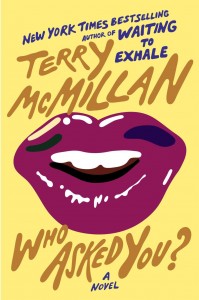Who Asked You? explores slices of LA life
Terry McMillan has long been known for her modern takes on the domestic drama. Works such as Waiting to Exhale and How Stella Got Her Groove Back have taken readers into complex love stories where happy endings are justified by much more than the necessities of the genre. Indeed, McMillan’s well-developed portrayals of black life have won her an NAACP Image Award and an Essence Lifetime Achievement Award for Excellence in Literature.

Who’s asking · Who Asked You? doesn’t contain a strong plot line; McMillan instead prefers to use the city as a hub for different profiles. – Courtesy of goodreads.com
Now, three years after the publication of 2010’s Getting to Happy, McMillan delivers a different sort of love story: one of self-fulfillment. Her latest novel, Who Asked You?, follows a host of characters as they struggle to find personal satisfaction in marriage, child-rearing and even just getting through high school. Rather than focusing on the typical goals of finding love or obtaining a successful career, McMillan’s characters try to “get unstuck” — that is, they try to separate themselves from the turmoil in their lives in order to achieve happiness.
Much of the novel centers around the 56-year-old Betty Jean, who takes in her two grandchildren after their drug-addicted mother disappears. Through Betty, McMillan sets up connections to characters such as Tammy, Betty Jean’s best friend and neighbor, as well as Venetia and Arlene, Betty Jean’s middle-aged sisters. There’s also Warren Daniels, the principal of the school that Betty Jean’s grandchildren attend, and Nurse Kim, a bombshell beauty who takes care of Betty Jean’s husband, Lee David. Among others, these make up the primary characters in McMillan’s eighth novel.
Admittedly, the first few chapters of Who Asked You? can get a little confusing as readers sort through the assortment of characters, but McMillan infuses each character with a distinct personality. In first-person narrative accounts, the characters share their perspectives in recognizable voices, giving readers their views on social issues, as well as their individual frustrations, with the contemporary world. Topics such as homosexuality, interracial marriage and gang warfare make their way into the characters’ commonplace conversations, adding a touch of gravity to the usual light-heartedness of a family drama. Creating such a variety of likable characters is a talent that McMillan developed as early as 1992’s Waiting to Exhale, which was divided up into chapters written from the points of view of four middle-class black women.
“I create these profiles, and then I let them tell their story,” McMillan said in an interview with the Los Angeles Times. “I have, like, a little job application thing. I know their favorite color, if they’ve ever done anything they’re ashamed of, do they pay their bills on time … What are you good at? … Have you ever been in love? You ever been to jail? I mean, I know these people.”
Though Who Asked You?’s characters certainly “tell their stories,” the novel doesn’t contain much in the way of plot. Instead, readers experience the characters’ everyday lives in central Los Angeles. Even as she has a few heated moments with her sisters or confrontations with her daughter, for example, Betty Jean picks up Happy Meals for her nephews or complains about the way her husband constantly watches Dora the Explorer. The novel grounds readers into the normality of the characters’ world before skipping time to show how they grow and develop. Who Asked You? is more of a snapshot into the lives of multiple characters than a single, fast-paced narrative. The novel, in essence, shows readers just how its characters “get unstuck.”
With the bevy of characters, however, McMillan hasn’t lost her witty humor. Her ability to deliver snappy one-liners and enchant readers with her punchy prose presents itself yet again in her eighth novel.
“[Right] after I sprinkle a few drops of vinegar, a pinch of salt, sugar, and paprika and start stirring the phone rings,” Jean says as she cooks in the kitchen. “I can’t see who it is from over here but I pray it’s a telemarketer and not either of my sisters…”
Likewise, even the novel’s “secondary characters” have their own wry humor.
“I don’t know how long roofs are supposed to last but it seems like mine didn’t start leaking until I kicked my husband out a little over three years ago, after 26 years of marriage,” Tammy says in the novel, before adding: “Good thing I’m not violent or he’d be in a plot in a cemetery.”
Such authorial wit drives much of Who Asked You? Where many novels rely on a suspenseful plot to carry readers to its end, McMillan’s lively prose makes finishing her latest novel a priority.
There are moments of Who Asked You?, however, that seem a bit off-putting. Though McMillan certainly has taken risks before in works such as Disappearing Acts, the grittier details of Who Asked You? (such as the truth behind Nurse Kim’s day job) seem a tad unwarranted. Certainly literature should have the free reign to delve into whatever topic it chooses, but readers have to wonder whether or not some moments in McMillan’s latest novel are necessary for the development of the story. At the very least, however, these not-so-subtle occurrences in the book prevent the novel’s characters from falling into a cookie-cutter format.
Still, the coarser moments of Who Asked You? don’t detract from the compelling nature of its characters’ tales. As McMillan weaves political commentaries around the intricate nuances of everyday life, she creates a respectable eighth novel that readers should enjoy.
Readers might not have asked for her characters’ intimate stories, but they’re certainly glad McMillan gave them to us.
Terry McMillan will give a talk and reading of Who Asked You? on Friday, Sept. 27 at 6 p.m. The event will be at the Eso Won Bookstore at the Museum of African American Art on Crenshaw Boulevard.
Follow us on Twitter @dailytrojan
